The phenomenon of burglaries shows a worrying upward trend in recent years.
What if it were possible to put an end once and for all to this scourge that is eating away at our society?
Imagine being able to sleep soundly, without fearing that an intruder might break into your home in the middle of the night. This is no longer an unattainable dream! Thanks to recent technological advances, there are now revolutionary security solutions within everyone's reach.
Gone are the expensive and ineffective alarm systems. Make way for intelligent and affordable protection, without a monthly subscription that burdens your budget.
After all, peace of mind shouldn't be a luxury reserved for an elite. Everyone deserves to feel safe in their home, whether it's a modest house or a city apartment.

ACTIVE Protection, the formidably effective solution against intrusions, burglaries, squatting, and home-jacking!
You're probably wondering what makes these new systems so exceptional? Unlike traditional devices that merely sound the alarm, active protection takes charge as soon as an intrusion is detected. Here's how it transforms your home into a real fortress:
- Thanks to the fog generator, it releases a thick fog that spreads instantly, plunging intruders into a dense cloud. Impossible for them to spot your valuables!
- A powerful siren is triggered, emitting frequencies specially designed to destabilize burglars.
- Blinding flashes irregularly illuminate the room, completely disorienting the criminals.
The most impressive part? All of this happens automatically, whether you're at home or not. No more stress during vacations or late-night outings!
How long does a burglary last?
You'd be surprised to learn how quickly a burglary can occur. The figures are eye-opening:
- On average, a burglar stays only 8 to 10 minutes in a property.
- Some experts even estimate that 3 minutes are enough for a "professional".
- More than half of burglaries are completed in less than 10 minutes.
Why such speed? The reasons are multiple:
- Burglars want to minimize the risks of being caught in the act.
- They primarily target what's easy to carry.
- The element of surprise works in their favor before any alarm goes off.
Make no mistake: even in a few minutes, the damage can be considerable. An experienced burglar can force a poorly secured door in the blink of an eye. That's why active protection, which reacts instantly, makes all the difference.
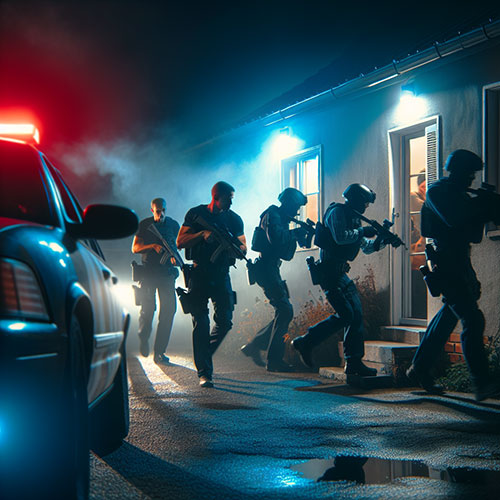
How long does it take for law enforcement to intervene?
You've surely asked yourself this crucial question: in case of a burglary, how long does it take for the police to arrive? It's a legitimate concern, and we're going to shed light on this subject. Here's what you need to know:- On average, law enforcement takes about 20 minutes to arrive on the scene. Reassuring? Not really...
- This delay is not set in stone. It can vary considerably depending on several factors: where you live, the number of patrols available, and the severity of the reported situation.
- Now, here's the most worrying part: a burglary usually lasts between 3 and 10 minutes. Do the math - in most cases, the criminals are long gone when the police arrive.
- Fortunately, there are solutions to reduce this delay. Alarm and remote monitoring systems can make a real difference by quickly alerting authorities and providing them with precise information about the intrusion.
Setting up an active defense system prevents criminals from stealing anything from your apartment or commercial premises, regardless of the intervention time by the police or a security agent.
Don't leave your security to chance. Take the lead and protect what matters most to you.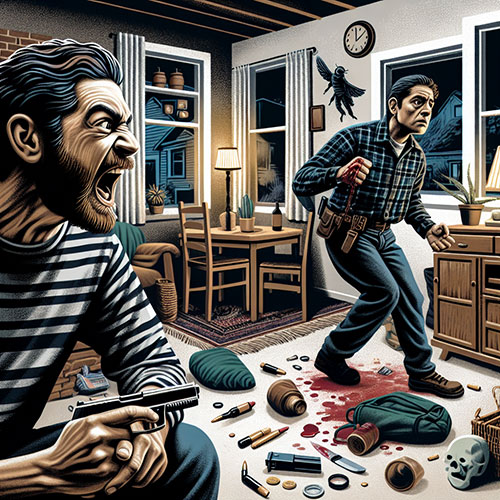
What are the dangers and consequences of intervening yourself during a burglary?
You hear a noise downstairs in the middle of the night. Your first reflex? Go down to see what's happening. Caution! This reaction, although understandable, can be extremely dangerous. Here's why it's crucial to resist this temptation and let professionals handle the situation.
Physical dangers
Imagine yourself face to face with one or more potentially armed individuals ready to do anything to escape. The risk of violent confrontation is very real, with potentially dramatic consequences. Let's not forget that some burglars may be under the influence of substances, increasing their unpredictability and dangerousness.
Legal consequences
Even if you think you're acting in self-defense, the law is complex in this matter. Injuring an intruder, even unintentionally, could expose you to legal prosecution. The notion of proportionality of the reaction is crucial and often difficult to prove in the heat of the moment.
Psychological impact
Beyond physical injuries, a confrontation with burglars can leave lasting psychological scars. Post-traumatic stress is not to be taken lightly, not to mention the feeling of guilt that could haunt you if things went wrong.
Practical consequences
By intervening, you risk compromising the police investigation by destroying essential evidence. Moreover, your action could complicate dealings with your insurance. Let the professionals do their job, it's the best way to protect your interests in the long run.
In the end, no material possession is worth the risk of putting your life in danger. Wisdom dictates staying safe, immediately calling law enforcement, and letting professionals handle the situation. Your safety is the absolute priority.
Avoid all contact with intruders
Active protection systems allow action without contact with the assailants.
Think about protecting yourself effectively, without violence and without risk!
Ideal for burglaries and home-jacking.

What are the legal consequences for someone who intervenes themselves during a burglary?
Avoid intervening in an intrusion at all costs. The legal consequences for a person who intervenes themselves during a burglary can be serious and largely depend on the circumstances. Here are the main points to consider:
Principle of self-defense
Imagine yourself facing an intruder in your home. Your heart is racing, adrenaline is pumping. You think about defending yourself, but be careful! The law is very specific on this point. Article 122-5 of the penal code defines three essential criteria for your action to be considered as self-defense:
- Timing is crucial: your defense must occur at the very moment of the aggression, not before, not after.
- Necessity is paramount: you must prove that you had no other choice but to defend yourself.
- Proportionality is key: your reaction must be commensurate with the threat, no more, no less.
Risks of legal prosecution
Be careful, if you don't follow these criteria to the letter, you could find yourself in a delicate situation. The justice system could prosecute you for:
- Voluntary violence: even if you thought you were doing the right thing, the law could consider your act as an assault.
- Voluntary homicide: in the most serious cases, if things get out of hand, you could face very serious charges.
Presumption of self-defense
Article 122-6 of the penal code provides for a presumption of self-defense in certain cases, notably:
- At night, your home is sacred: if someone tries to break in, the law is on your side.
- In the face of violence, you have the right to protect yourself: if thieves use force, you can defend yourself.
Potential consequences
Even if the law is on your side, don't forget that the consequences can be severe:
- Prepare yourself for a legal marathon: procedures can be long and costly.
- Your mind could suffer: psychological trauma is often underestimated.
- Watch your back: the risk of retaliation is unfortunately very real.
Discover the benefits of our active security solutions - Euro Security Protect

Instant deterrence:
One of the main advantages of the fog generator is its ability to instantly deter burglars and intruders.
As soon as it is activated, the generator releases a thick fog that obscures visibility in just a few seconds.
This rapid and intense reaction leaves the criminal with no other option than to leave the premises without delay.
Infallible protection:
Unlike traditional security systems, the fog generator offers infallible protection with formidable effectiveness. Even if burglars manage to enter a property, the fog prevents them from locating and stealing valuables. This ensures maximum security of property and minimizes potential losses.
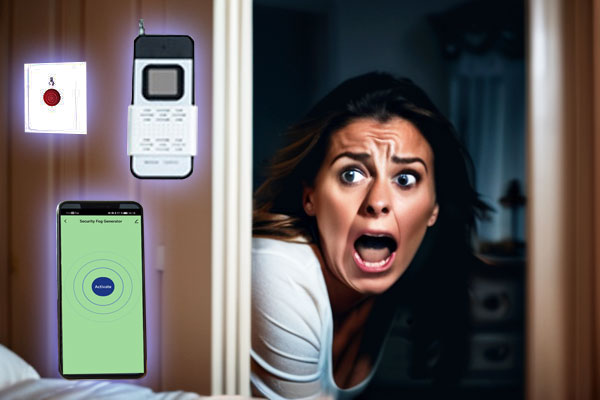
Safety for occupants:
In addition to protecting material possessions, the fog generator also ensures the safety of occupants. By creating a confusing and unpredictable environment, it significantly reduces the risk of direct confrontation between burglars and residents. Occupants can then get to safety or contact the authorities without exposing their physical integrity.
The fog generator can be activated:
- - By the Panic button
- - With the remote control
- - On your mobile phone

An effective and economical solution, accessible to all:
Today, far too many homes are vulnerable to burglaries and squats.
Whether for a main residence, a second home, empty apartments waiting for tenants, businesses or storage premises, it is really time to put an end to this scourge by protecting yourself now with our active protection solution, for a fixed price, without subscription, and really accessible to all.
This is an economical and terribly effective solution.
By significantly reducing the risk of theft and damage, the generator minimizes the costs associated with claims and repairs, and may even lead to a reduction in insurance premiums.
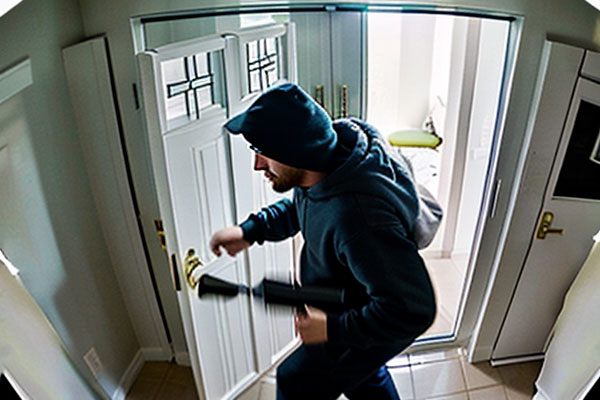
Protection against squatters:
The problem of squatters is becoming more and more recurrent, a real nightmare for owners.
When a property is squatted, you have 48 hours to notify the police who have the possibility to dislodge them.
Beyond this period, a real obstacle course begins to recover accommodation, with endless procedures, accompanied by heavy financial losses.
The best solution is to activate the smoke generator as soon as intruders enter to prevent them from seizing the accommodation.
It will then be appropriate to inform the police that a squatting attempt has taken place so that they can monitor the building.
Of course, go to the site to secure your apartment and recharge the generator in case of recurrence.
Protect yourself once and for all with a fog generator, which will not allow squatters to settle in.
How does our active anti-burglary kit work?
Our kit includes:
- - 1 4K camera with human detection managed by artificial intelligence
- - 1 smoke generator that can be activated remotely with your mobile phone
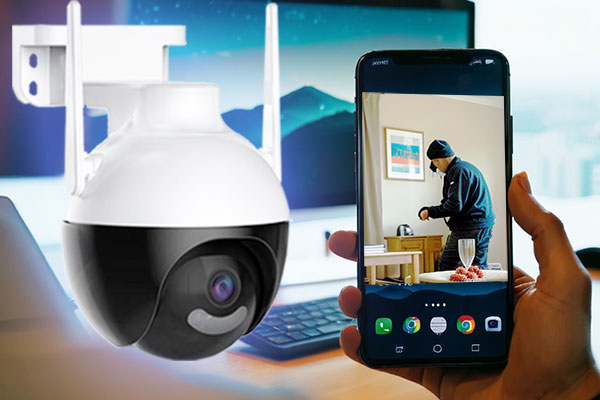
The 8 Mega pixel surveillance camera for 4K resolution
Our camera offers a 4K resolution of 3840 x 2160 pixels for a clear and precise image.
It can connect to your WiFi network, or directly wired RJ45 to your router or internet box.
It can be viewed remotely via the supplied mobile application (Android and IoS), or locally with the VMS software for PC, also supplied.
It integrates human detection managed by artificial intelligence which sends you an alert on your phone as soon as an intruder is detected.
You can then connect to the camera and view your accommodation.
If you clearly identify an intrusion, you can immediately activate the smoke generator to stop the burglary without delay.
The camera can rotate horizontally by 352° and vertically by 95°. The rotation is done directly on the mobile application.
It is possible to insert a Micro-SD memory card (up to 128 GB) so that the camera records videos of possible intrusions.
Viewing these videos is accessible directly on the mobile app.
Finally, the camera works perfectly at night, thanks to the integrated infrared LEDs (black and white images).
In case of human detection, the white LEDs light up to obtain a color image.
The camera has other features such as:
- - Listen to what is happening in the room
- - Talk to the person in violation
- - Trigger an integrated siren

The smoke generator
Our smoke generator can be activated:
- - With the emergency button (supplied).
- - With the radio frequency remote control (supplied).
- - By dry contact, coming for example from an alarm center that you already have.
- - From your mobile phone, wherever you are.
The smoke generator connects via WiFi to your internet box.
It can then be triggered very easily remotely, from the Tuya Smart mobile application.
The smoke spreads in the room in 20 seconds, making visibility zero.
Burglars or squatters have no choice but to leave the premises and abandon their intrusion.
The generator effectively diffuses smoke over a volume of 150 cubic meters, or 40 to 60 square meters.
For larger areas, it is possible to add other generators for optimal protection.
